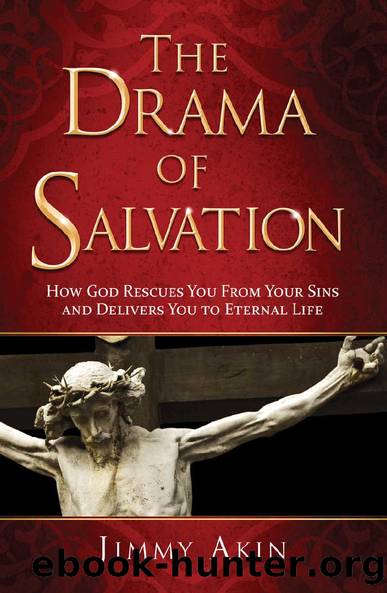The Drama of Salvation: How God Rescues You from Your Sins and Brings You to Eternal Life by Jimmy Akin

Author:Jimmy Akin [Akin, Jimmy]
Language: eng
Format: epub
Publisher: Catholic Answers Press
Published: 2015-03-25T16:00:00+00:00
9
Outside the Church, No Salvation?
Is salvation connected with one’s religious identity? Does it matter to God whether you are a Christian—or whether you are a Catholic in particular? Do you have to be a baptized, card-carrying member of a particular church in order to get into heaven? Will God cast you into hell if you’re not?
These are sensitive questions, but they are questions that cannot be avoided. Since the beginning of Church history, Christians have announced the gospel and the offer of salvation through Jesus Christ. Rejecting this offer has been regarded as rejecting salvation itself.
Furthermore, Christ established a Church, and he wills his followers to belong to it. To refuse to become or remain a member of his Church imperils one’s salvation. Historically, this has been summed up in the phrase Extra Ecclesiam, nulla sallus, which is Latin for “Outside the Church, no salvation.”
To non-Christians, the claim that one must be a Christian in order to be saved can sound arrogant. In the same way, to non-Catholics, the claim that one needs to be a Catholic to be saved can sound arrogant. In both cases, though, the truth is otherwise.
Christians do not believe that they are saved because they are superior people. They acknowledge that they are sinners and are saved only by the mercy of God. The same is true of Catholic Christians in particular.
To say that salvation may be found in the Christian Faith and in the Catholic Church is not to make an arrogant boast of superiority. It is to identify the channels of God’s mercy and to invite others to receive it as well.
“But surely there are many people who are neither Christian nor Catholic through no fault of their own!” one may protest. “Doesn’t God care for them, too? Won’t he make it possible for them to be saved?”
We thus see two, related insights at work. On the one hand, there is the insight that God has intervened in history to give us the means to be saved. On the other hand, there is the insight that salvation should still be possible for those who have not embraced these means through no fault of their own.
How these two insights are to be squared has a history dating back to the Bible.
EXCLUSIVITY IN SCRIPTURE
As we saw in chapter 3, the Old Testament is principally concerned with temporal salvation. There is very little material in it concerning eternal salvation. While the ancient Israelites believed in an afterlife (otherwise they would not have had to have been warned against using mediums; Deut. 18:10–12), the details of it were unclear, and the hope of the resurrection was revealed in the later phases of the Old Testament’s composition.
As a result, there is no clear vision of how to achieve a favorable state in the afterlife, although worshipping God and obeying his will would surely have been understood as contributing to that.
There was not, however, an expectation that people needed to become Jewish in order to be saved. The Israelites
Download
This site does not store any files on its server. We only index and link to content provided by other sites. Please contact the content providers to delete copyright contents if any and email us, we'll remove relevant links or contents immediately.
The Abolition of Man by C. S. Lewis(1470)
Mere Christianity by Lewis C. S(797)
Liespotting: Proven Techniques to Detect Deception by Pamela Meyer(773)
Jesus Among Secular Gods: The Countercultural Claims of Christ by Ravi Zacharias & Vince Vitale(731)
Mere Christianity by C. S. Lewis(606)
Christianity for Modern Pagans: Pascal's Pensées by Peter Kreeft(540)
The Everlasting Man by G.K. Chesterton(499)
City of God by Saint Augustine(485)
The Harvest Handbook™ of Apologetics by Joseph M. Holden(477)
A War of Loves by David Bennett(451)
Answering Jewish Objections to Jesus by Michael L. Brown(449)
Jesus Among Secular Gods by Ravi Zacharias(434)
God's Crime Scene by J. Warner Wallace(427)
The Facts on the Bible (The Facts On Series) by John Ankerberg(413)
On Stories: And Other Essays on Literature by C. S. Lewis(410)
The Consequence of Ideas by Sproul R. C(404)
The Story of Reality by Gregory Koukl(403)
City of God (Penguin Classics) by Augustine(399)
Orthodoxy by Gilbert K. Chesterton(393)
